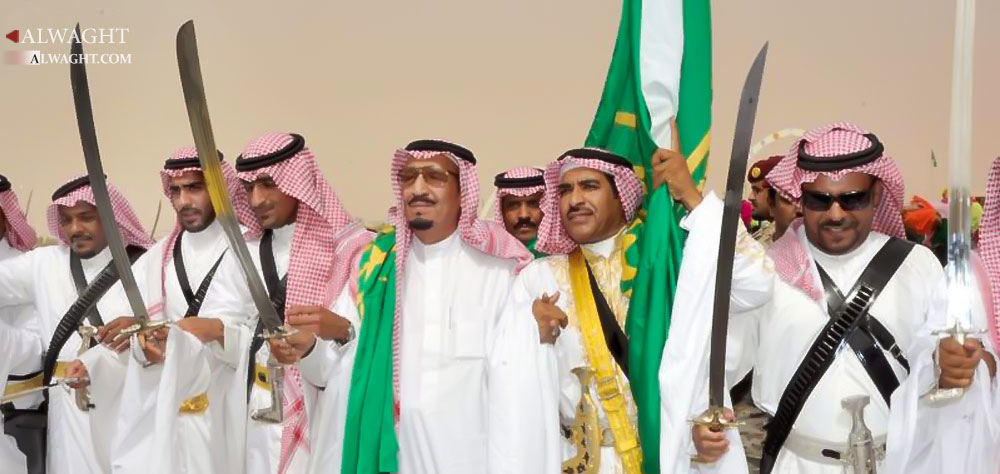Alwaght- Before outbreak of the Arab uprisings of 2011, Saudi Arabia traditionally adopted a conservative and cautious foreign policy, and always tried to steer clear of direct confrontation with challenges, and actually was in favor of compromises with the current conditions affecting it.
However, the new uncertainties and polarizations coming up as a result of the Arab revolutions after 2011 have pushed Saudi Arabia to break out of its safe and easy haven. Now the rhetoric and nature of Riyadh’s foreign policy has undergone an essential transformation and grown more impertinent.
Although a limited number of Saudi analysts suggest that the drastic change of the kingdom came as a result of an expansion of the self-confidence, many others believe that the impertinence of Riyadh is stirred by a feeling of vulnerability inside the kingdom.
The grounds of the Saudi Arabian leaders’ feeling of vulnerability date back to before 2011 Arab revolts, to the time of invasion of Iraq by the US and the resultant regional balance that ensued. During the recent decade, there was a crystal clear loss of influence of the Saudis in the Levant region-which covers Lebanon, Syria and relatively some parts of Iraq- while on the opposite side Iran held a sway in Iraq, consolidated alliance with Syria and supported Hezbollah in Lebanon.
Reacting to Tehran’s growing regional strength, Riyadh went to great lengths to shore up its alliance with such friendly countries as Egypt and Jordan and establish a Sunni coalition in the face of the alleged Shiite Crescent that covers Iran, Iraq, Yemen, and some parts of Syria and Lebanon.
In 2011, the destability literally put Riyadh in an encirclement. The popular demonstrations in Bahrain from the east, revolt in Yemen from the south, Syria’s conflict from west and ongoing instability in Iraq, where there is Iraq, have sent the Saudis intimidated. Due to presence of Saudi Arabian leaders’ sectarian inclinations and existence of a fervent Shiite minority in Saudi Arabian Eastern Region’s cities, Riyadh developed a severe worry over the possibility of the protests creeping into its own territory. Since then, the soft power instruments in diplomacy of the Saudis including use of specifically-dedicated media, financial incentives and religious credibility were overshadowed by Saudi decision to use force in Bahrain, Syria and Yemen.
Saudi Arabia has done its best to beef up its regional leadership, but its efforts for forging stronger unity and organization of the (Persian) Gulf Cooperation Council, which contains a number of allied Arab states, have met with failure. In 2011, the Saudi proposal for improvement of political cohesion of the Cooperation Council was left undealt with. Also, Washington has supported the Council members in a bid to build a united military body, but to its disappointment, this idea, too, failed to see the light.
The unity of view among the Persian Gulf Arab states over the neighboring Iran and the popular uprisings in the region did not resist for a long time. The deep gaps caused dispute between Qatar and the UAE over Libya, Egypt and the Muslim Brotherhood group across the region. Also the disaccords led to a Qatari-Saudi confrontation in Syria.
However, recently Saudi Arabia under leadership of king Salman bin Abdulaziz has stepped out of its conventional place, spearheading an anti-Iranian front in the region. The Saudi-led front has drawn considerable backup also for its so-called anti-ISIS terror group efforts.
Furthermore, Saudi Arabia has managed to forge a military coalition including the Persian Gulf Arab states, Jordan, Morocco, Egypt and Sudan in support of Riyadh’s intervention in Yemen. The kingdom tried but failed to get Pakistan involved in the anti-Yemeni alliance, though.
Moreover, Saudi Arabia has made an agreement with other members of the Arab League to form a joint military force in a bid to counter the regional security threats. Many questions on establishment of such an Arab army remain unanswered by Saudi Arabia, however.
Saudi Arabia is showing an increasing profligacy in terms of use of its military and financial properties all to protect its own interests across the region. To contain the threats, the kingdom has given priority to establishment of regional alliances so that it responds should a threatening and destabilizing situation arises in the region.
The more Saudi Arabia quells the internal developments and suppresses them upon outbreak, and blurs the security lines with other Persian Gulf Arab states in a bid to stop spillover of uprisings to its neighboring regions, and plays the game of transitional governments in the uprising-hit countries, the more its policies would openly leave negative influences on the democracy-seeking regional nations.



























